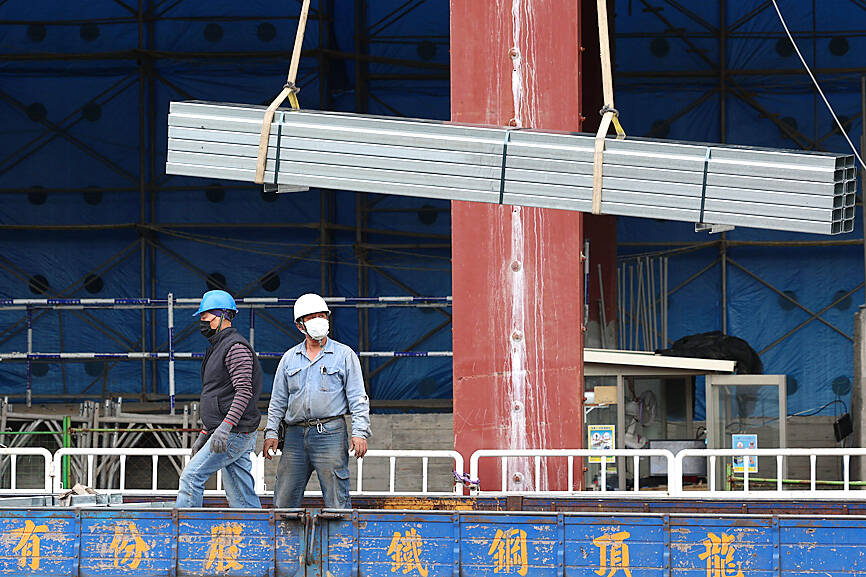The climate monitor for Taiwan’s manufacturing industry last month showed a depressed economy amid weakened demand, suppressed selling prices and dampened operating conditions, the Taiwan Institute of Economic Research (TIER, 台灣經濟研究院) said yesterday.
The TIER business composite index was 9.7, shedding 1.18 points from a month earlier, heading into a recessionary zone for the first time since August 2020.
The Taipei-based think tank attributed the retreat mainly to continued monetary tightening in the US and Europe intended to fight inflation, which has curtailed demand for goods and services.

Photo: Sean Chao, Taipei Times
China’s surge in COVID-19 infections has also lent uncertainty to an ongoing slowdown previously induced by oppressive disease control measures and other disruptions.
Export orders and manufacturing growth are expected to continue to contract over the next few months amid inventory adjustments, government data showed.
The largest decrease was in demand, with a drop of 0.67 points, followed by a 0.27 point decline in operating conditions, TIER’s monthly survey showed.
Input and selling price measures edged down 0.19 points and 0.11 points respectively, while the cost reading gained 0.06 points, it showed.
Local manufacturers are the mainstay of exports, which account for 60 percent of the nation’s GDP.
About 72.4 percent of companies experienced a business downturn, swelling from 41.2 percent in October, TIER said, adding that 27 percent described their operations as “sluggish,” and less than 1 percent managed to hold steady. No respondent posted growth.
Textile and pulp suppliers took a hit from slumping demand in the US and Europe, despite resilient sales at home, the institute said.
Similarly, makers of petrochemical and plastic products remained weighed by inventory corrections, although the entry of more players helped reduce cost burdens, it said.
Base metal product vendors are tightening their belts to cope with conservative purchasing strategies by upstream and downstream clients, it said.
The global economic slowdown is hitting non-tech manufacturers harder than tech firms, given that demand for chips used in 5G and high-performance computing remains strong, TIER said.
However, sales of smartphones, computers, wearables and peripheral products tumbled, as people assign prefer in-person experiences in the post-COVID-19 era, it said.
Transportation tool makers reported soft business as inflation affected vehicle purchases, it said.

Micron Memory Taiwan Co (台灣美光), a subsidiary of US memorychip maker Micron Technology Inc, has been granted a NT$4.7 billion (US$149.5 million) subsidy under the Ministry of Economic Affairs A+ Corporate Innovation and R&D Enhancement program, the ministry said yesterday. The US memorychip maker’s program aims to back the development of high-performance and high-bandwidth memory chips with a total budget of NT$11.75 billion, the ministry said. Aside from the government funding, Micron is to inject the remaining investment of NT$7.06 billion as the company applied to participate the government’s Global Innovation Partnership Program to deepen technology cooperation, a ministry official told the

Taiwan Semiconductor Manufacturing Co (TSMC, 台積電), the world’s leading advanced chipmaker, officially began volume production of its 2-nanometer chips in the fourth quarter of this year, according to a recent update on the company’s Web site. The low-key announcement confirms that TSMC, the go-to chipmaker for artificial intelligence (AI) hardware providers Nvidia Corp and iPhone maker Apple Inc, met its original roadmap for the next-generation technology. Production is currently centered at Fab 22 in Kaohsiung, utilizing the company’s first-generation nanosheet transistor technology. The new architecture achieves “full-node strides in performance and power consumption,” TSMC said. The company described the 2nm process as

Shares in Taiwan closed at a new high yesterday, the first trading day of the new year, as contract chipmaker Taiwan Semiconductor Manufacturing Co (TSMC, 台積電) continued to break records amid an artificial intelligence (AI) boom, dealers said. The TAIEX closed up 386.21 points, or 1.33 percent, at 29,349.81, with turnover totaling NT$648.844 billion (US$20.65 billion). “Judging from a stronger Taiwan dollar against the US dollar, I think foreign institutional investors returned from the holidays and brought funds into the local market,” Concord Securities Co (康和證券) analyst Kerry Huang (黃志祺) said. “Foreign investors just rebuilt their positions with TSMC as their top target,

POTENTIAL demand: Tesla’s chance of reclaiming its leadership in EVs seems uncertain, but breakthrough in full self-driving could help boost sales, an analyst said Chinese auto giant BYD Co (比亞迪) is poised to surpass Tesla Inc as the world’s biggest electric vehicle (EV) company in annual sales. The two groups are expected to soon publish their final figures for this year, and based on sales data so far this year, there is almost no chance the US company led by CEO Elon Musk would retain its leadership position. As of the end of last month, BYD, which also produces hybrid vehicles, had sold 2.07 million EVs. Tesla, for its part, had sold 1.22 million by the end of September. Tesla’s September figures included a one-time boost in